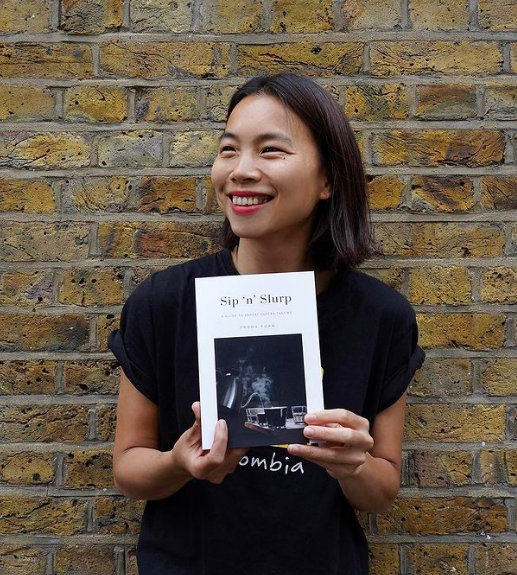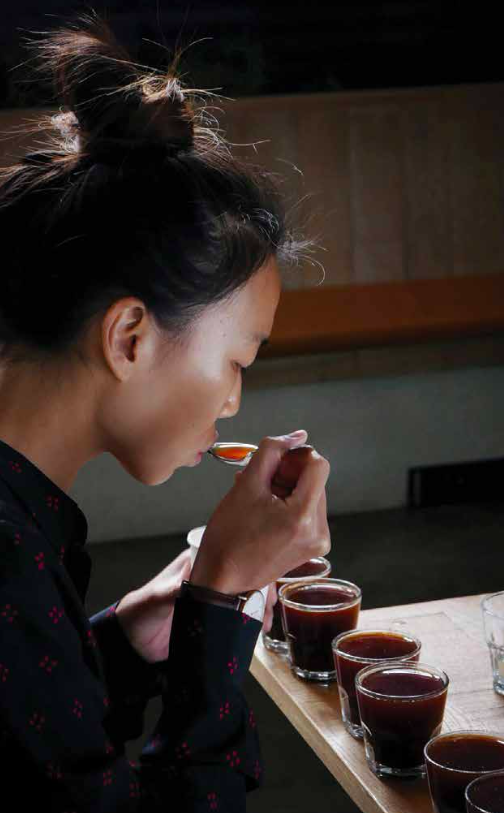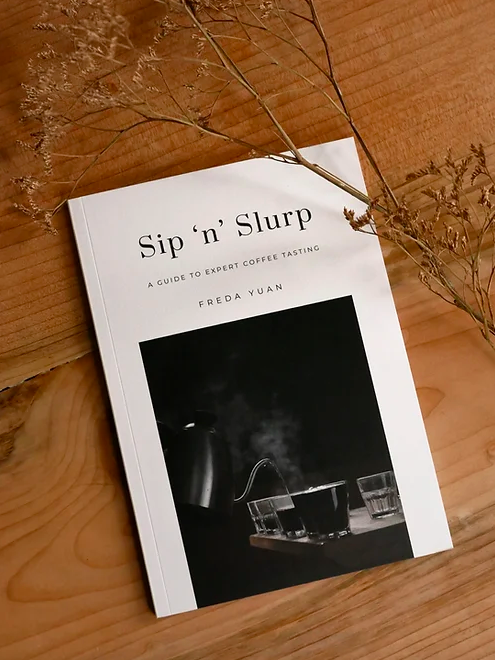Tasting coffee mindfully can unlock new experiences, not only in flavour, but in life.
Interview with Freda Yuan
Freda Yuan tastes coffee for a living. She has won three UK Cup Tasters Titles. She has battled bulimia and depression. She has a written a book on tasting coffee. Freda is curious and ambitious and tasting coffee helped her to find a new perspective on life. We are inspired by her journey and we hope it resonates with you too. This was one of my favourite interviews of 2022, originally published in Issue 40. Thank you for your time Freda!

You have spent almost a decade working in coffee, can you tell us a little of your story?
I'm originally from Taiwan and my love of coffee began when I went to Australia, in Melbourne and I lived there for a year and a half. And I really enjoyed a coffee culture there. What I really liked is that it's a place to gather, it's a place to enjoy the food and have fun with friends. And I really liked the vibe! When I went back to Taiwan, I felt like something was missing - I really wanted to do something with coffee! I was very lucky to get a working holiday visa to the UK, so I came to London, with no family or support whatsoever, but my purpose was very clear: I wanted to learn how to make coffee like the Australians! And then I could open a cafe back home in Taiwan.
I started to work in Taylor Street Baristas, which is a cafe that is located in the city so it's very busy. It's mostly take-away coffee. And the volume is huge. The daily consumption was about 1600 coffees. So I learned all of my dialling-in espresso basics and brewing basics under that kind of intensity. I started to shift my idea from owning a cafe, thinking maybe I needed to look into some other way to have a career in coffee because I really, really enjoyed making coffee. I love the human aspect of it. I love tasting. I could taste coffee during the period of learning to become a barista. And that's something that got me hooked. So I started to focus on the cupping and sensory side of coffee, even though I had never worked in a roastery before.
I really liked London, so I need to look into potentially a work sponsorship visa or you know, find a husband (!) or I need to study in order to get a student visa. So, I went the studying route and during that time I connected with a lot of coffee professionals trying to improve my coffee, got my barista professional skills certification, I acquired Q-Grader certification, I became an AST (qualified trainer) to get myself prepared, because I knew in order to stay in the UK, I needed to get a sponsorship visa for a longer term. Eventually, I managed to mingle my way into Caravan Coffee Roasters. I showed up almost twice a week during my final dissertation time, just to show them my face and hoping that they could get me a visa.
I was desperate to stay in London, I love the coffee culture here. I like that it's an international hub that I can travel to different European countries and visit coffee friends there. And also, it's a city that you can really be yourself. And I think that's what I liked the most because coming from traditional Chinese culture, you know, my family, everything, I felt conditioned and strained in Taiwan, but coming to London really, in a way freed me and helped me to understand who I am and to find my my own path.
So I was quite lucky. Eventually Caravan offered me a work visa. And I was the quality control manager in the roastery. So I tasted all the roasted coffee, every batch that is roasted to maintain quality and consistency. They also had a sister company, which is a green coffee importing business so I got to handle both roasted coffee and start to understand the green coffee side of business.
And that was also the period that I got into coffee competitions and ended up winning a couple UK Cupping Championships!

And how did you get to be a green coffee expert for one of the most well-known coffee companies in the UK, Origin Coffee Roasting?
Well, their coffee buyer was leaving the job. And the owner Tom came to me and said, Look, we have this job for you, I'm wondering if you're interested in taking it! I wasn't sure if I was ready or not. I was nervous. But there was an opportunity, and I just felt I had to take it otherwise I might never have a chance like this again!
So I did! And initially it was a big disaster, because I didn't know what I was doing! But now I know what I'm doing. And I freaking love my job! I love it because there's so many human aspects of it. I can visit the producers creating and maintaining a relationship, which is the most exciting part for me, because I can grow together with the producers. Every single harvest we learn from each other. We're growing together in volume wise, so I see that as you know my favourite aspect in buying coffee.
I am excited about getting in different coffees that break peoples preconceived ideas. For example, I bought some really good Indonesian coffee. That's so clean and delicious. But people think about Indonesian coffees quality as very poor. I also want to break the accepted ideas of Panamanian coffee. People generally think that it's always Geisha and that Panamanian coffee is always expensive, but that's not actually not true. I have some really friendly pricing and really delicious Panamanian coffee. So eventually, this year, I decided, okay, I want to buy a few containers of Panamanian coffee because I happen to need some blend components. So eventually, I bought two containers of Panamanian coffee to UK and I think that's the fun part of it. Make it making it work, making it happen.
I really enjoy my work because operations and talking to people, creating culture, is part of it. Initially I was the Head of Coffee, but now I've been promoted to Director of Coffee. And I feel really humbled that I can get this opportunity to to lead and make some changes, not just for Origin Coffee only, but also for the industry as a whole as well. So I am very happy where I am right now.
For coffee professionals, cupping is a very important and well-revered technique, but can you explain to the consumers exactly why that is and how it can benefit them to do cupping at home?
So for green coffee professionals, cupping is super important. Basically I do it every single day. It's a little bit like going to a supermarket and you know, there are so many different products and but it's also a lot of the same thing, different brands of the same things. But if there’s the opportunity to try the brands, like little tasters in the supermarket and you're able to try a soup or the cheese or the wine, it's easier to understand what you’re buying and make informed choices. So that’s what cupping helps coffee buyers do.
There is so much information unveiled through tasting the coffee. So, for example, I'm able to understand what the terroir of the coffee is, how the farmer works in terms of quality control and processing methods. After cupping, I always talk to my long term partner producers. We will discuss what I have tasted in the Cup profile and how that relates to their processing. You know, all of the hard work that they have done is translated through cupping. So, it's super important to understand cupping and then to identify the flavour differences of from the coffee and to communicate with the producers. If I work with a producer every single year and I'm able to cup his coffee and tell him, okay, so you're this coffee tastes like this. And I'm he explaining to me what he technique, how he did his process. And then we realised, okay, there is a defect in, in the cup so he can potentially change his way of processing and then change the profile to be more positive or this cup score might be even higher than before. So that's the benefit of cupping as a buyer to communicate with the producers.
But also because of our relationship, cupping creates a channel for us to be honest with each other. Even though the coffee may not taste good every harvest, or even the coffee did taste good. And then we can grow together. And I think that's why partnerships and relationship coffee is important. And that's what I'm really passionate about.
Ed's Note: Find a simple Cupping Recipe here to get you started!
Sip ’n’ Slurp, your book, is a distillation of all your experience in coffee, as well as a guide on how to be in the moment with sensory experiences. How has coffee and in particular tasting it, influenced your life?
And how I got into cupping. It's another story! When I was dabbling in coffee as a barista I was still in my learning phase. I had bulimia and I was depressed. So it was really hard for me to stay focused. And when I was tasting a coffee, I realised that because of bulimia, I would purge and then the acid from the stomach was burning my palate, and actually, I couldn’t taste much coffee, and that gave me a reason to say, okay, I need to be really careful taking care of myself.
When tasting coffee, I pay a lot of attention to all the attributes, and that brings me to the present moment. Tasting mindfully doesn’t just help to improve my sensory skill, it also help me to develop an awareness for my live. It’s that awareness that helps me to look at myself in different angle and that helps me to identify coffee flavours or it helps me to notice my perspective. If my perspective is negative, my awareness is able to alarm me that this is not the correct way to see things and it helps me to shift my mindset to positive.
When I realised that I can really identify and analyse coffee quite well it set me on a journey of learning. I feel it really saved my life because, you know, I was really depressed, and so I was hurting myself. And like I said, when I realised that, oh, tasting coffee can help me with my career, I started to pay really a lot of attention to it and I stop hurting myself. And that really helped me to transform my thinking because when I pay more attention to tasting, I'm living in a moment. and when we are living in the moment, we are fulfilled. I feel tasting coffee and, you know, tasting anything or any sensory experience, if we're really paying attention, it'll really, really help us to enjoy life more. And that's where I am right now. I really enjoy my life. And I think when we tried to taste coffee and trying to identify the differences, that awareness is is transferable. You become more aware of other things in your life.

Do you have any tips for improving your palate or training yourself to experience new things/flavours?
So firstly being mindful and being present when tasting anything. And secondly, I would highly recommend people who who just getting into coffee and, and trying to understand cupping to try solutions tasting. So that’s learning to isolate the different tastes of sweet, salty, umami, acidity and bitterness. And through my book, it has a step by step guide and a few experiments of ideas by different tasters helping with how you identify different attributes. So I highly recommend people can buy my book as well!
Has the explosion of experimentally processed coffees across the specialty coffee industry had a big impact at a cupping level?
I think this definitely is a controversial question. For me as a coffee buyer, my personal preference is I would like to buy something that is traditional, almost quiet, elegant, maybe not as expressive as the anaerobic fermentation style of coffees. And an aerobic processing really depends on how the producer manages their processing. So, for example, some processes when the coffee is fermented in the tank for too long with the anaerobic method, it creates some like cinnamon or spicy aromas and flavours and sometimes that's related to the embryo of the green coffee, the seed has died in the process and therefore created those flavour notes. It really is a tough coffee for me, because I understand there's demand for this type of products, but for me personally, with these type of experiments you’ve lost the terroir of the coffee, lost the true essence of how those coffees should be. It also comes down to each producers financial level, whether they have enough money to get the processing equipment, whether they have time to do it right, or would it be easier for them to create just ‘normal’ coffee. Because there is also always the danger of messing up the fermentation side. It’s difficult! Grading these coffees is definitely hard because, suddenly there's different flavour coming through. As a cupper, we are trained to be objective, we should be fair, so we will definitely score based on the normal markers of acidity, body, defects. But whether the flavour is desirable? It really depends. So again, depends on the market. So I think in Asia, this type of flavour is super popular. But I think in Europe, we're still quite traditional. We like really good coffee, but I think those profiles are less desirable.
What are your thoughts on the flavour wheel as a tool for tasting?
So yeah, about flavour. I think the flavour wheel is quite controversial in a way. For example, I have mangoes in Taiwan, they're super delicious, they're really sweet and floral. But the mango here in Europe? They're quite acidic and less sweet. So when we talk about mango, we could be talking about completely different flavour profiles based on region. So it’s a bit tricky when you are having cross-country discussions about flavour. To be honest, like there are so many other ways to explore tasting. For example, you can look it up, Cross Modal Correspondence, that's using different senses to express a particular sense. So for example, sometimes when we taste coffee, we see colours. Sometimes when we taste coffee, we see shapes, and those can be universal ways of expressing ourselves. So perhaps there's room for that area to grow as well.
What is a coffee you’ve tasted recently that blew your tastebuds away?
So I have to admit, I'm very lucky to try a lot of really good, high end coffee. But I also try a lot of bad coffee, by the way, so there's balance there. One of the coffees I remember the most lately was the coffee from Ratibor Hartmann in Panama and basically, they do a really good process of the coffee. It is a natural anaerobic, and they put sugar in the fermentation tank. And that coffee has a lot of layers, very expressive with a lot of tropical fruits, apricot, pineapple, mango. It was good as espresso, that’s what one of our barista competitors used for UK Barista Champs this year. Very good with milk as well. And yeah, it's just a nicely layered, fun coffee!
Has travelling to origin shifted your perspective on how coffee currently is and should be valued?
This is such a big question. Definitely. It has changed my perspective in every way. I feel that everything we have, you know, the food we eat, the house we live in, the car, the clothes, the shoes. We are so privileged to be able to have all of this. And so lucky that it comes so easy. And yet, you know, some origins I visited there still trying to work on their basics and that really inspired me to buy more coffee from those countries and to support those producers or coffee growers. And it definitely sort of like, pushed me to sell more coffee, because the more coffee we sell, the more coffee we can buy to support the producers.